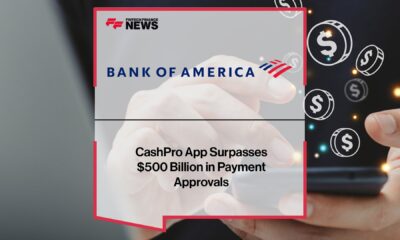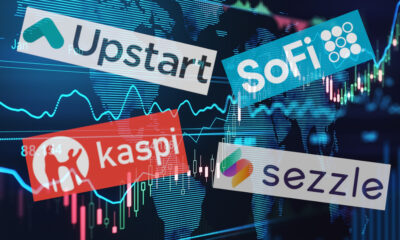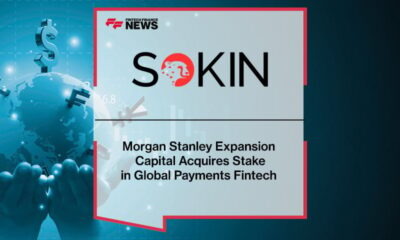Fintech
These could be the best-performing Fintech stocks through 2030

Fintech stocks aren’t exactly a new stock category. Money-related companies (such as banks and brokers) have embraced technology as a means to better serve their customers since the advent of the World Wide Web in 1989.
The financial technology sector is still rapidly evolving and could look significantly different in five years.
To that end, here’s a roundup of the three fintech stocks that could prove to be the best performers through 2030. Each company is perfectly positioned to capitalize on an opportunity that is not only sizable, but also undervalued.
SoFi Technologies
Online banking is nothing new. But it is not out of place to suggest most of the majors banks they are still struggling on this front. Their digital offerings often feel like afterthoughts and don’t necessarily mesh well with their physical presence.
That’s not the case SoFi Technologies (NASDAQ: SOFI), however. It has been built from the ground up since its launch in 2011 to be an online bank. In fact, it has no physical branches; it’s strictly an online-only outfit. It still has all the offerings you would expect from a more traditional bank, including loans, checking accounts, investments, deposits and credit cards, to name a few.
The fact is that its online-only service is more than enough to attract an increasingly larger audience. At the end of the first quarter it boasted just over 8.1 million customers, which was 44% more than in the same period last year. In fact, SoFi has added customers in every quarter since the beginning of 2020, when it only served just over 1 million members.
This is still just the beginningHowever.
You see, as much as the world (and North America in particular) has embraced the idea of managing banking matters online or through an app, we’re at something of an inflection point. That is, today’s young adults have never known a world without the Internet; most of them don’t even remember a world without smartphones. This crowd is completely comfortable with the idea of not having access to a physical bank branch. In fact, a recent survey conducted by the American Bankers Association indicates that 74% of millennials prefer digital banking services over in-person services, while 64% of Gen-Z say the same. This is in contrast to older consumers, most of whom will do their banking online or with an app, but aren’t exactly enamored with the idea of not having a physical branch to visit when needed.
It matters simply because, according to Pew Research, millennials have recently become the largest segment of the U.S. population and are entering their highest-earning wealth-building years. Don’t be surprised to see SoFi’s customer growth rate accelerate from here.
The story continues
PayPal holdings
PayPal holdings (NASDAQ: PYPL) isn’t just a fintech stock. It is probably the original name of the fintech, launched in 1998 to help the then nascent eBay start online marketplace and e-commerce business. For years it was the only player dedicated to payments technology.
Of course, serious rivals have also made their way onto the market in the meantime. To blockThe e Cash App Adyen come to mind as direct competitors, even if the alternatives are popular Amazon Pay and a handful of cryptocurrency wallets have also dented PayPal’s share of the payments intermediary market. The COVID-19 pandemic only shone a spotlight on these other payment options, as much of the world’s commerce was suddenly being handled online.
However, with all this dust finally settling, something curious is becoming clear. PayPal is still the leader of the payment platform market and is still growing. The company facilitates nearly half of the world’s online purchases, but still managed to increase total transactions last quarter by 11% to 6.5 billion. This growth follows last year’s 12% increase in the amount of total payment volume handled by PayPal.
How does the aging company hold up so well in such a competitive environment?
Much of this resilience can be attributed to the fact that it was first to market. The world is familiar with the brand and its offerings, and therefore is comfortable staying with PayPal even if alternatives are available: it is easier to keep a customer than to win a new one.
It’s also worth noting, however, that PayPal probably uses its whopping 200 petabytes of digital data better than any of its competitors, direct or indirect. This is something CEO Alex Chriss plans to do even more aggressively now that AI tools can make it even more useful.
The kicker: Newcomers will get into PayPal stock while its price is only 16 times higher than trailing earnings per share. For perspective, the S&P500‘s current price-to-earnings ratio stands at 23 times its earnings.
MasterCard
Last but not least, add MasterCard (NYSE: MA) to your list of fintech stocks to buy for their superior performance potential between now and 2030.
No, it’s not a highly regarded fintech name. This is because it has been so well defined over the past few decades as a credit card processor. Don’t be fooled though. While it is still first and foremost a card payments intermediary, it is leveraging the power of technology to continue expanding its business.
Let’s take its Labs-as-a-Service division as an example. This arm aims to “co-innovate with customers to deliver impactful, customer-centric experiences by creating innovative products, platforms and services.” This unit co-created Emirates airline’s customer rewards program, for example, while Mastercard’s so-called Test & Learn technology allows retailers to determine which products are most in demand and then stock them accordingly. Mastercard was also one of the first names to embrace the idea of cryptocurrency-based digital wallets, even without knowing what the future of cryptocurrencies would be. These and many other overlooked innovations are only made possible thanks to the advent of the right technologies, which Mastercard will gladly employ when there is a good reason.
Strengthening this opportunity is the frequency with which cash is still used to buy and sell goods and services. The US Federal Reserve reports that approximately 18% of all payments made in the United States are made in cash, while another 13% are direct bank transfers. These are transactions that would probably be better handled with a modern debit or credit card.
On that note, Mastercard’s expected revenue growth of 11% this year is followed by next year’s expected growth of more than 12%. This is significantly better than the growth rates of most other companies over the same time frame. It’s also a pace of growth that will be sustainable for at least the next few years, as Mastercard continues to figure out how to best leverage new technologies.
Should You Invest $1,000 in Mastercard Right Now?
Before you buy Mastercard stock, consider this:
The analyst team at Motley Fool Stock Advisor has just identified what they believe is the 10 best stocks for investors to buy now… and Mastercard wasn’t one of them. The 10 stocks that made the cut could produce monster returns in the coming years.
Consider when Nvidia you created this list on April 15, 2005… if you invested $1,000 at the time of our recommendation, you would have $553,880!*
Stock Advisor provides investors with an easy-to-follow model of success, including guidance on building a portfolio, regular updates from analysts, and two new stock picks every month. The stock advisory service has more than quadrupled the return of the S&P 500 Index since 2002*.
*Equity advisor will return starting May 13, 2024
John Mackey, former CEO of Whole Foods Market, an Amazon subsidiary, is a member of The Motley Fool’s board of directors. James Brumley has no position in any of the securities mentioned. The Motley Fool has positions and recommends Adyen, Amazon, Block, Mastercard and PayPal. The Motley Fool recommends eBay and recommends the following options: long January 2025 $370 calls on Mastercard, short January 2025 $380 calls on Mastercard, short July 2024 $52.50 calls on eBay, and short June 2024 $67 calls .50 on PayPal. The Motley Fool has a disclosure policy.
Prediction: These could be the best-performing Fintech stocks through 2030 was originally published by The Motley Fool
Fintech
US Agencies Request Information on Bank-Fintech Dealings

Federal banking regulators have issued a statement reminding banks of the potential risks associated with third-party arrangements to provide bank deposit products and services.
The agencies support responsible innovation and banks that engage in these arrangements in a safe and fair manner and in compliance with applicable law. While these arrangements may offer benefits, supervisory experience has identified a number of safety and soundness, compliance, and consumer concerns with the management of these arrangements. The statement details potential risks and provides examples of effective risk management practices for these arrangements. Additionally, the statement reminds banks of existing legal requirements, guidance, and related resources and provides insights that the agencies have gained through their oversight. The statement does not establish new supervisory expectations.
Separately, the agencies requested additional information on a broad range of arrangements between banks and fintechs, including for deposit, payment, and lending products and services. The agencies are seeking input on the nature and implications of arrangements between banks and fintechs and effective risk management practices.
The agencies are considering whether to take additional steps to ensure that banks effectively manage the risks associated with these different types of arrangements.
SUBSCRIBE TO THE NEWSLETTER
And get exclusive articles on the stock markets
Fintech
What changes in financial regulation have impacted the development of financial technology?

Exploring the complex landscape of global financial regulation, we gather insights from leading fintech leaders, including CEOs and finance experts. From the game-changing impact of PSD2 to the significant role of GDPR in data security, explore the four key regulatory changes that have reshaped fintech development, answering the question: “What changes in financial regulation have impacted fintech development?”
- PSD2 revolutionizes access to financial technology
- GDPR Improves Fintech Data Privacy
- Regulatory Sandboxes Drive Fintech Innovation
- GDPR Impacts Fintech Data Security
PSD2 revolutionizes access to financial technology
When it comes to regulatory impact on fintech development, nothing comes close to PSD2. This EU regulation has created a new level playing field for market players of all sizes, from fintech startups to established banks. It has had a ripple effect on other markets around the world, inspiring similar regulatory frameworks and driving global innovation in fintech.
The Payment Services Directive (PSD2), the EU law in force since 2018, has revolutionized the fintech industry by requiring banks to provide third-party payment providers (TPPs) with access to payment services and customer account information via open APIs. This has democratized access to financial data, fostering the development of personalized financial instruments and seamless payment solutions. Advanced security measures such as Strong Customer Authentication (SCA) have increased consumer trust, pushing both fintech companies and traditional banks to innovate and collaborate more effectively, resulting in a dynamic and consumer-friendly financial ecosystem.
The impact of PSD2 has extended beyond the EU, inspiring similar regulations around the world. Countries such as the UK, Australia and Canada have launched their own open banking initiatives, spurred by the benefits seen in the EU. PSD2 has highlighted the benefits of open banking, also prompting US financial institutions and fintech companies to explore similar initiatives voluntarily.
This has led to a global wave of fintech innovation, with financial institutions and fintech companies offering more integrated, personalized and secure services. The EU’s leadership in open banking through PSD2 has set a global standard, promoting regulatory harmonization and fostering an interconnected and innovative global financial ecosystem.
Looking ahead, the EU’s PSD3 proposals and Financial Data Access (FIDA) regulations promise to further advance open banking. PSD3 aims to refine and build on PSD2, with a focus on improving transaction security, fraud prevention, and integration between banks and TPPs. FIDA will expand data sharing beyond payment accounts to include areas such as insurance and investments, paving the way for more comprehensive financial products and services.
These developments are set to further enhance connectivity, efficiency and innovation in financial services, cementing open banking as a key component of the global financial infrastructure.
General Manager, Technology and Product Consultant Fintech, Insurtech, Miquido
GDPR Improves Fintech Data Privacy
Privacy and data protection have been taken to another level by the General Data Protection Regulation (GDPR), forcing fintech companies to tighten their data management. In compliance with the GDPR, organizations must ensure that personal data is processed fairly, transparently, and securely.
This has led to increased innovation in fintech towards technologies such as encryption and anonymization for data protection. GDPR was described as a top priority in the data protection strategies of 92% of US-based companies surveyed by PwC.
Financial Expert, Sterlinx Global
Regulatory Sandboxes Drive Fintech Innovation
Since the UK’s Financial Conduct Authority (FCA) pioneered sandbox regulatory frameworks in 2016 to enable fintech startups to explore new products and services, similar frameworks have been introduced in other countries.
This has reduced the “crippling effect on innovation” caused by a “one size fits all” regulatory approach, which would also require machines to be built to complete regulatory compliance before any testing. Successful applications within sandboxes give regulators the confidence to move forward and address gaps in laws, regulations, or supervisory approaches. This has led to widespread adoption of new technologies and business models and helped channel private sector dynamism, while keeping consumers protected and imposing appropriate regulatory requirements.
Co-founder, UK Linkology
GDPR Impacts Fintech Data Security
A big change in financial regulations that has had a real impact on fintech is the 2018 EU General Data Protection Regulation (GDPR). I have seen how GDPR has pushed us to focus more on user privacy and data security.
GDPR means we have to handle personal data much more carefully. At Leverage, we have had to step up our game to meet these new rules. We have improved our data encryption and started doing regular security audits. It was a little tricky at first, but it has made our systems much more secure.
For example, we’ve added features that give users more control over their data, like simple consent tools and clear privacy notices. These changes have helped us comply with GDPR and made our customers feel more confident in how we handle their information.
I believe that GDPR has made fintech companies, including us at Leverage, more transparent and secure. It has helped build trust with our users, showing them that we take data protection seriously.
CEO & Co-Founder, Leverage Planning
Related Articles
Fintech
M2P Fintech About to Raise $80M

Application Programming Interface (API) Infrastructure Platform M2P Financial Technology has reached the final round to raise $80 million, at a valuation of $900 million.
Specifically, M2P Fintech, formerly known as Yap, is closing a new funding round involving new and existing investors, according to entrackr.com. The India-based company, which last raised funding two and a half years ago, previously secured $56 million in a round led by Insight Partners, earning a post-money valuation of $650 million.
A source indicated that M2P Fintech is ready to raise $80 million in this new funding round, led by a new investor. Existing backers, including Insight Partners, are also expected to participate. The new funding is expected to go toward enhancing the company’s technology infrastructure and driving growth in domestic and international markets.
What does M2P Fintech do?
M2P Fintech’s API platform enables businesses to provide branded financial services through partnerships with fintech companies while maintaining regulatory compliance. In addition to its operations in India, the company is active in Nepal, UAE, Australia, New Zealand, Philippines, Bahrain, Egypt, and many other countries.
Another source revealed that M2P Fintech’s valuation in this funding round is expected to be between USD 880 million and USD 900 million (post-money). The company has reportedly received a term sheet and the deal is expected to be publicly announced soon. The Tiger Global-backed company has acquired six companies to date, including Goals101, Syntizen, and BSG ITSOFT, to enhance its service offerings.
According to TheKredible, Beenext is the company’s largest shareholder with over 13% ownership, while the co-founders collectively own 34% of the company. Although M2P Fintech has yet to release its FY24 financials, it has reported a significant increase in operating revenue. However, this growth has also been accompanied by a substantial increase in losses.
Fintech
Scottish financial technology firm Aveni secures £11m to expand AI offering

By Gloria Methri
Today
- To come
- Aveni Assistance
- Aveni Detection
Artificial intelligence Financial Technology Aveni has announced one of the largest Series A investments in a Scottish company this year, amounting to £11 million. The investment is led by Puma Private Equity with participation from Par Equity, Lloyds Banking Group and Nationwide.
Aveni combines AI expertise with extensive financial services experience to create large language models (LLMs) and AI products designed specifically for the financial services industry. It is trusted by some of the UK’s leading financial services firms. It has seen significant business growth over the past two years through its conformity and productivity solutions, Aveni Detect and Aveni Assist.
This investment will enable Aveni to build on the success of its existing products, further consolidate its presence in the sector and introduce advanced technologies through FinLLM, a large-scale language model specifically for financial services.
FinLLM is being developed in partnership with new investors Lloyds Banking Group and Nationwide. It is a large, industry-aligned language model that aims to set the standard for transparent, responsible and ethical adoption of generative AI in UK financial services.
Following the investment, the team developing the FinLLM will be based at the Edinburgh Futures Institute, in a state-of-the-art facility.
Joseph Twigg, CEO of Aveniexplained, “The financial services industry doesn’t need AI models that can quote Shakespeare; it needs AI models that deliver transparency, trust, and most importantly, fairness. The way to achieve this is to develop small, highly tuned language models, trained on financial services data, and reviewed by financial services experts for specific financial services use cases. Generative AI is the most significant technological evolution of our generation, and we are in the early stages of adoption. This represents a significant opportunity for Aveni and our partners. The goal with FinLLM is to set a new standard for the controlled, responsible, and ethical adoption of generative AI, outperforming all other generic models in our select financial services use cases.”
Previous Article
Network International and Biz2X Sign Partnership for SME Financing
IBSi Daily News Analysis

SMBs Leverage Cloud to Gain Competitive Advantage, Study Shows
IBSi FinTech Magazine

- The Most Trusted FinTech Magazine Since 1991
- Digital monthly issue
- Over 60 pages of research, analysis, interviews, opinions and rankings
- Global coverage
subscribe now
-

 DeFi10 months ago
DeFi10 months agoDeFi Technologies Appoints Andrew Forson to Board of Directors
-

 Fintech10 months ago
Fintech10 months agoUS Agencies Request Information on Bank-Fintech Dealings
-

 News11 months ago
News11 months agoBlock Investors Need More to Assess Crypto Unit’s Earnings Potential, Analysts Say — TradingView News
-

 DeFi10 months ago
DeFi10 months agoSwitchboard Revolutionizes DeFi with New Oracle Aggregator
-

 DeFi10 months ago
DeFi10 months agoIs Zypto Wallet a Reliable Choice for DeFi Users?
-

 News11 months ago
News11 months agoBitcoin and Technology Correlation Collapses Due to Excess Supply
-

 Fintech10 months ago
Fintech10 months agoWhat changes in financial regulation have impacted the development of financial technology?
-

 Fintech10 months ago
Fintech10 months agoScottish financial technology firm Aveni secures £11m to expand AI offering
-

 Fintech10 months ago
Fintech10 months agoScottish financial technology firm Aveni raises £11m to develop custom AI model for financial services
-

 News1 year ago
News1 year agoValueZone launches new tools to maximize earnings during the ongoing crypto summer
-

 Videos4 months ago
Videos4 months ago“Artificial intelligence is bringing us to a future that we may not survive” – Sco to Whitney Webb’s Waorting!
-

 Markets1 year ago
Markets1 year agoCrypto Expert Provides Analysis of Top Altcoins, Market Sees Slight Rise


















